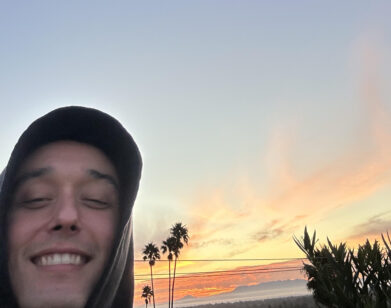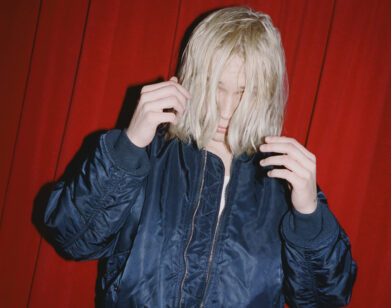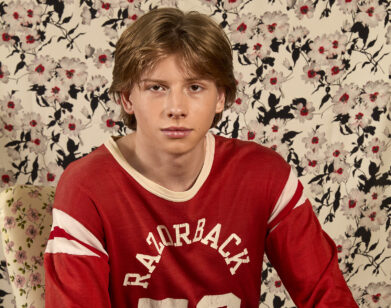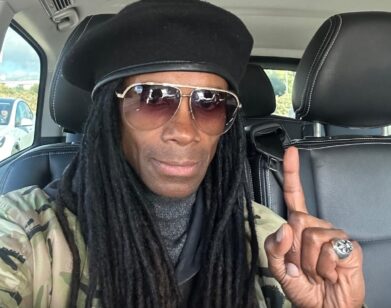The Mynabirds’ Laura Burhenn Gets Specific
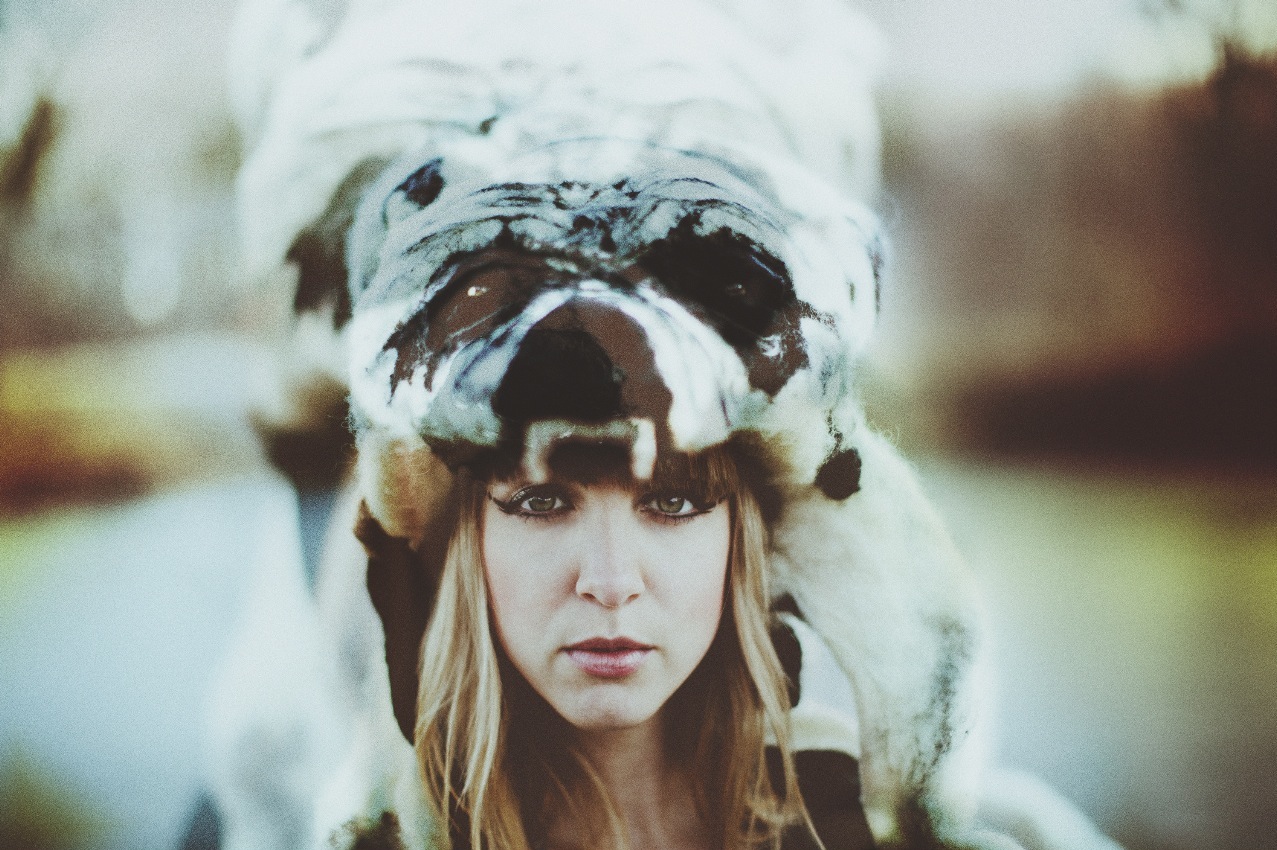
IMAGE COURTESY OF DP MULLER
Laura Burhenn has her eyes on you. In press photos, album art, and even during our one-on-one conversation at Saddle Creek records in Omaha, Nebraska, the Mynabirds’ leading lady is focused with steely determination. It’s not just the coffee she’s constantly sipping: Burhenn means business. “I wanted this new record to be direct,” she says. “The last record [What We Lost in the Fire We Gained in the Flood] was almost like watching myself from afar, working something out. And with this one, I’m looking at you in the eye, and we are going to talk about this. Look at me. Look at me, right here. This is a dialogue.”
The “dialogue” Burhenn refers to is a political one. On her last LP, Burhenn was still licking her wounds. Lost in the Fire found the singer-songwriter in a new city and state of mind, navigating both the personal politics of her past and the dynamics of making peace with herself. That was two years ago. GENERALS, out today on Saddle Creek, boasts an energized, empowered (and caffeinated) Burhenn. No mere collection of tunes, GENERALS is tied together with a unifying narrative that artistically explores her desire for social change. Through an alterego whom Burhenn describes as the “wolf mother,” Burhenn bares her fangs—literally—toward the one percent and prowls through the record’s territory in search of resolution. Both in character and out, Burhenn seeks vindication on behalf of all the oppressed, regardless of gender, ethnicity or creed. “Some of it is me singing,” she explains, “and some of it is me imagining this collective consciousness of women singing.”
Burhenn’s ambitious sophomore outing as The Mynabirds is a blend of many things that shouldn’t work together, and yet do so effortlessly, all due in full to Burhenn’s ferocious sincerity—it’s a concept record from an artist who previously garnered countless Dusty Springfield comparisons, a meditation on motherhood from someone who has no children, and an anthemic battle cry rooted in pacifism. Pausing a game of catch with Charlie, her four-year-old black Labrador, Burhenn sat down with us to dissect GENERALS track by track.

“KARMA DEBT”: When I was setting out to write this album that was political in nature, I thought about all of the artists who have been criticized for raising their voice and speaking out about anything other than a broken heart. I was thinking about the way we spend money, and the way we take things for our own—not even preservation—but just downright greed. So it was like, “What am I doing here as an artist? Does it mean anything?” Luckily, I don’t have to decide that. I care about my world around me, and what I can do [as an artist], so I’m gonna sing it.
“WOLF MOTHER”: I loved the idea of creating this overarching wolf-mother character watching out for her cubs. She’s like, “I see what’s going on around me. I see your tricks. You can’t pull the wool over my eyes.” It’s interesting to me, I feel like a lot of my friends are at the age where they’ve had kids or they’re having kids. And, I don’t have any kids. But, there is a certain point in your life where you stop thinking solely about yourself. And you start thinking about everyone. The community around you. The next generation. And, trying to figure out how we’re going to protect and provide for them. Stephanie Drootin, who plays with Big Harp on my label [Saddle Creek], is the executive director of Omaha Girls Rock. There, she is giving the next generation the tools they need to find their own voices. I think it’s just not about protecting your own kids and raising them right. It’s about raising kids all around you right.
“GENERALS”: I wanted it to be this battle cry, you know? The song starts with artists, and our ability to make money and survive. And in a broader sense, I was thinking about what we spend our money on as a society. It’s not education. It’s not health care. The fact that our health care system is so fucked up… I don’t even want to get started on that, but we don’t have money to pay for all these things that don’t contribute to our health in our society, and the next time we turn around, we’re throwing billions of trillions of dollars at some war. It’s depressing to me that, as a society, we chose to spend our money on things that destroy us rather than build us up. So, that frustration is sort of an extension of the wolf mother cry. Which calls out for more boots on the ground. For the end of it. During the breakdown of the song, I ask, “Are we going to fix it, or fuck it up?” [pauses] I just love the many ways in which we can use the word “fuck.” [laughs]
“RADIATOR SISTER”: It’s this really fun expression of getting shit done and having fun while you’re doing it. It was like throwing paint at a canvas. I remember talking to one of my close friends who was going through a really rough time. So we went to Goodwill, bought a bunch of plates and black paint. We painted on the plates things we were frustrated with—ourselves, or our situations that we weren’t happy with. And we took the plates to a parking lot, yelled things out loud and smashed them. It was so much fun. The record is this expression of rage, and love, and… Jackson Pollock. It’s sort of a Jackson Pollock record.
“DISASTER”: I needed the record to get to a point where it broke. Where it really felt the darkest. The world is literally crumbling around the person in the song. And yet, there’s hope. There’s the line, “Hold on just a little bit longer / I got your back / I promise to keep you from going under.” Also that bell at the very end—every time I hear it, my ears kind of twitch. I feel like it really cleanses your mental palate. And, I really feel like I’m dating myself here, but have you ever listened to those read-along books with the 45 record players? I had a Mickey Mouse one when I was a kid. You’d read along, and there was a bell that would ding. It would tell you when to turn the page. So that’s what that bell reminds me of. “Okay, it’s time to turn the page.” There’s probably iPad versions for kids now. [laughs]
“MIGHTIER THAN THE SWORD”: Two years ago, one of my friends committed suicide. I was thinking about, if I could talk to someone, what could I possibly say to them what hasn’t been said? How do you tell someone in a new way, “Don’t kill yourself, it’s going to get better?” I think we all say, “Hang on, it’s going to get better.” And, ultimately, I don’t know what you say. My mom’s mother committed suicide, my dad’s brother committed suicide. And I never really knew either of them, but I grew up with an awareness of it. I was thinking, what can I give someone in writing this song? So I’m sending love. At the end of the song, the coda goes, “If you forget the words, I will sing them for you.” I think that’s the best thing we can do about for our friends. When you are down, when you are out, lean on me.
“BODY OF WORK”: It addresses this idea of empowering ourselves to make our lives exactly what we want them to be. I was envisioning, sometimes, you’re being pushed or like a stone being rolled. And sometimes you’re a roller. A high roller. You’re lucky. You’re doing well. Or, you’re an avalanche. You’re falling apart! But you can also be wild horses on a hill. Let’s not forget that we are powerful beyond our wildest dreams. There’s this quote from Jean-Paul Sartre [that I use] in the song, which goes, “Freedom is what you do with what’s been done to you.”
“DISARM”: I’ve seen a lot of people in relationships who are constantly in battle mode. It’s hard to watch when people are just stuck in that endless cycle. And, I thought of [this problem] on a larger level—in the world, countries against countries, and that cycle perpetuates itself on a large level as well. I love the idea of, if you talk about someone being “disarming,” it’s such a telling statement. If you think of approaching someone who’s very disarming, what are their characteristics? They’re friendly. They smile. They might reach their hand out, and ask you how you’re doing. So, I loved that kind of double entendre. Which is, how do you get people to come closer to you and welcome you in and engage in a conversation peacefully? Well, you have to disarm. You have to be disarming.
“BUFFALO FLOWER”: This is a love song to my ladies of the plains. [laughs] In “Wolf Mother,” we’re talking about the red of the river. In “Buffalo Flower,” we’re talking about cleaning that same river. Clearing the air, clearing the death and destruction, and rebuilding society. I allude to the idea of the “City Upon a Hill,” which I read about in Naomi Wolf’s Give Me Liberty. In her book, Wolf asks in regards to America, is this a nation predestined by God for glory? Or is it a nation aspiring for greatness that has to make it happen? With “Buffalo Flower,” I argue that it’s the latter. Greatness is something we’re in charge of.
“GREATEST REVENGE”: I [started writing] this song shortly after September 11th. I was dating someone at the time who lived in New York, and I went to go pick him up. It was so surreal to be there. I remember walking the streets with him. There were soldiers with tanks, gas masks, and machine guns. And, New Yorkers walking around in their T-shirts and jeans. All this, and the weather was beautiful that day. It’s such a strange contrast! I was young and in love, and there’s this horrible tragedy that’s happening all around us. And how do you make sense of that? I think, ultimately, the question that’s begged in “Karma Debt” is, what can I do to make a difference? And on “Greatest Revenge,” it’s coming to terms with how, individually, you can’t fix everything. But, you can fix whatever relationships are right around you. If everyone focused on truly loving their neighbor and loving themselves, loving their lovers, their husbands, their sisters, their brothers, then maybe we could fix the whole thing.
THE MYNABIRDS’ NEW ALBUM GENERALS IS OUT TODAY. THE BAND IS CURRENTLY ON TOUR AND PLAYS MERCURY LOUNGE ON JUNE 22. FOR MORE INFORMATION ON THE ARTIST, PLEASE VISIT THEIR WEBSITE.

